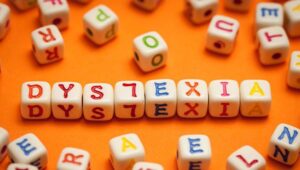 Dyslexia is a learning disorder that involves challenges with reading, affecting areas of the brain that processes language. Children and adults with the disorder have normal intelligence yet have trouble identifying speech sounds and decoding letters and words when reading. A 2017 study indicates that about 11.5 million people are affected by dyslexia nationally. If you or a loved one is exhibiting symptoms of dyslexia, it’s time to find out if you may have a correctable vision problem instead.
Dyslexia is a learning disorder that involves challenges with reading, affecting areas of the brain that processes language. Children and adults with the disorder have normal intelligence yet have trouble identifying speech sounds and decoding letters and words when reading. A 2017 study indicates that about 11.5 million people are affected by dyslexia nationally. If you or a loved one is exhibiting symptoms of dyslexia, it’s time to find out if you may have a correctable vision problem instead.
Signs of dyslexia can be difficult to recognize and that’s why it’s important to make an appointment to see a doctor to receive a proper diagnosis. It also makes sense to schedule a comprehensive functional vision evaluation at Vision For Life since some symptoms can be shared by people with dyslexia and individuals with vision problems. These symptoms include poor eye teaming and eye tracking as well as perceptual problems. Words can appear on a page or be reversed for individuals with dyslexia, making it difficult to read, spell and write.
There is not a cure for dyslexia, but early assessment and intervention can result in the best outcome. Dyslexia can go undiagnosed for years and in some cases, may not be recognized until adulthood. It’s important to seek medical attention to receive proper diagnosis and treatment. If someone has symptoms of dyslexia but does not receive the diagnosis from their doctor, it could mean that they are suffering from a vision problem unrelated to dyslexia.
Vision For Life assists many patients with symptoms that mimic dyslexia. We can help improve visual efficiency as well as visual processing. A functional vision exam will establish if the problem is a visual one, and in some cases, our patients have both dyslexia and a vision problem. If this is the case, vision therapy can be part of a multi-disciplinary approach. Vision For Life does not directly treat the dyslexia, however; it allows an individual to be more responsive to educational instruction.
If you or your child are having difficulty reading, the issue could stem from a combination of problems and not just one singular issue. The ability to read depends on a variety of elements and uses visual, language, phonetic and decoding skills. While reading, it’s also important to understand the written words to successfully learn. Unfortunately, vision problems may also be misdiagnosed as ADHD, autism, and learning disabilities. Optimal vision performance is achieved when focusing, eye tracking, teamwork and visual perception are all working in unison.
Other reading-related symptoms that you or a loved one may be experiencing may include:
- A dislike for reading
- Tired after having to read
- Lack of comprehension when reading
- Spatial awareness issues which reverses words and letters while reading (which are often misdiagnosed as dyslexia)
- Amblyopia or lazy eye (one eye dominates and does most of the work)
- Convergence insufficiency (inability to aim eyes together when reading)
- Strabismus (wandering eyes which can be unnoticeable to the naked eye)
After proper diagnosis of a vision problem, Vision For Life creates a complete and individualized vision therapy program to help with reading and development. Every program is age-appropriate and will enhance reading performance for any learning-related vision problems, visual rehabilitation, or binocular vision conditions.
Wondering if it’s time to have your child’s vision assessed or wondering if you may have vision related issues of your own? Give us a call at 618-288-1489. At Vision For Life, we are able to develop a custom plan that will yield the most effective results. Don’t delay contacting us any longer if you believe a reading problem exists due to a vision issue. You can also find more information about us at https://visionforlifeworks.com.
